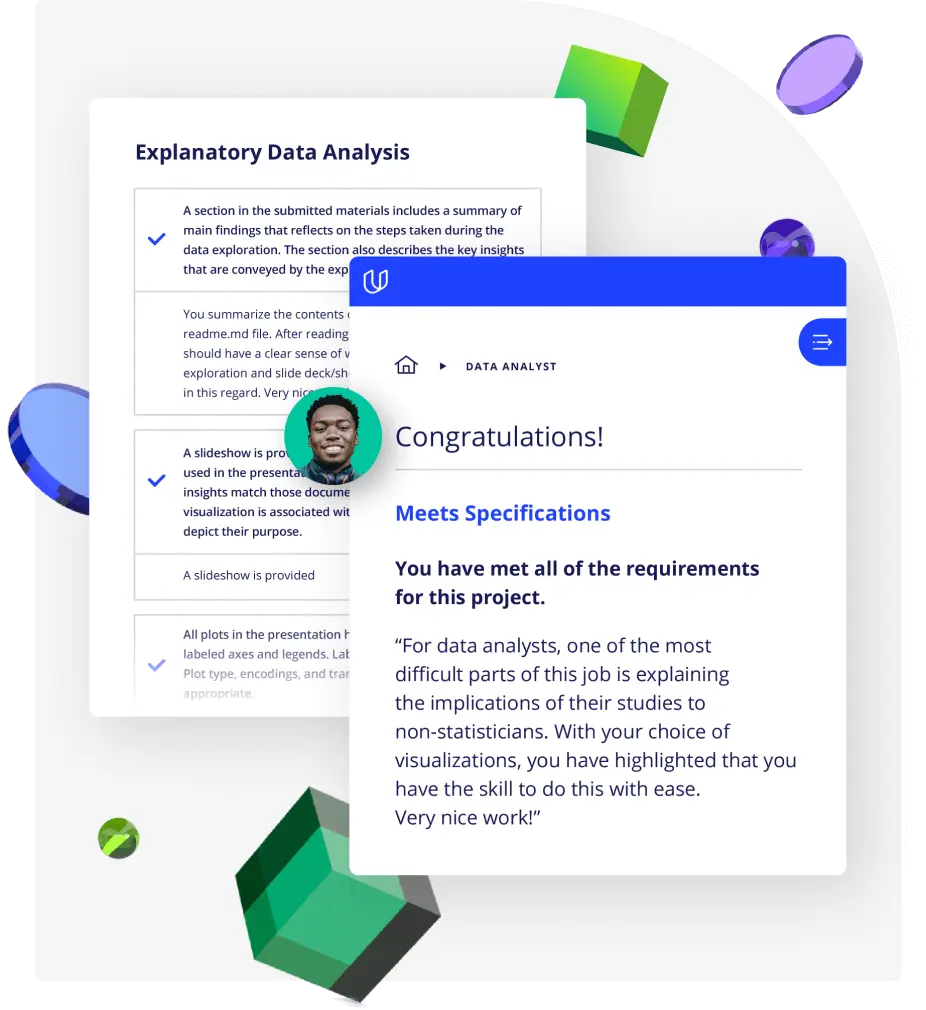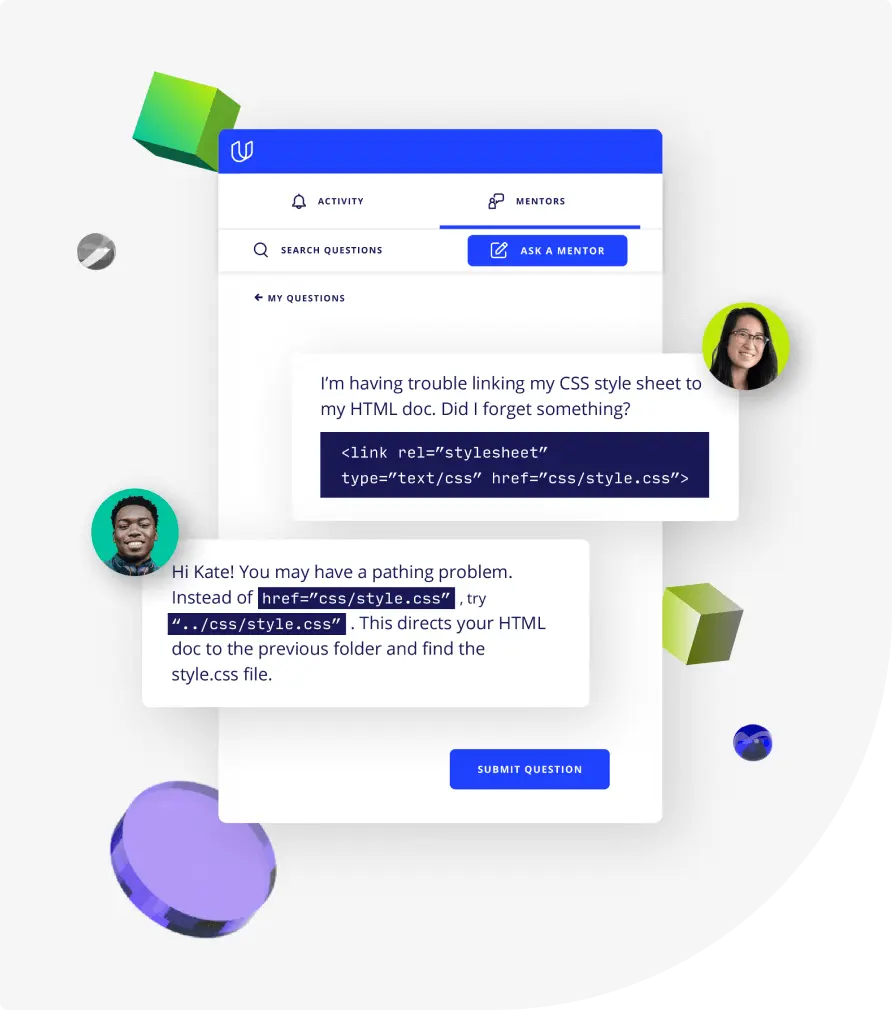Lesson 1
Get Help with Your Account
What to do if you have questions about your account or general questions about the program.

Nanodegree Program
Get hands-on practice with over 100 data structures and algorithm exercises and guidance from a dedicated mentor to help prepare you for interviews and on-the-job scenarios.
Get hands-on practice with over 100 data structures and algorithm exercises and guidance from a dedicated mentor to help prepare you for interviews and on-the-job scenarios.
Intermediate
3 months
Real-world Projects
Completion Certificate
Last Updated July 26, 2024
Skills you'll learn:
Prerequisites:
Course 1 • 2 weeks
Start with a warm welcome to the program by refreshing your Python skills and learning about problem solving and efficiency!
Lesson 1
What to do if you have questions about your account or general questions about the program.
Lesson 2
You are starting a challenging but rewarding journey! Take 5 minutes to read how to get help with projects and content.
Lesson 3
Welcome to the Data Structures and Algorithms nanodegree program!
Lesson 4
A quick refresh on Python basics!
Lesson 5
A systematic way of approaching and breaking down problems.
Lesson 6
Understanding the importance of efficiency when working with data structures and algorithms.
Lesson 7 • Project
Deconstruct a series of open-ended problems into smaller components (e.g, inputs, outputs, series of functions).
Course 2 • 4 weeks
Learn about the core data structures used in programming.
Lesson 1
Introduction to the Data Structures course.
Lesson 2
Learn about Arrays and Linked Lists
Lesson 3
Build Stacks and Queues
Lesson 4
Apply Recursion to Problems
Lesson 5
Learn about basic tree's, tree traversal and binary search trees.
Lesson 6
Explore the concepts of maps and hashes.
Lesson 7 • Project
Solve a series of open-ended practice problems. Hone your skills to identify and implement appropriate data structures and corresponding methods that meet given constraints.
Course 3 • 4 weeks
Learn about the basic algorithms used in programming.
Lesson 1
Start out with some elementary algorithms such as binary search, tries, heaps and more.
Lesson 2
Learn about the most common sorting algorithms.
Lesson 3
Go deeper into algorithms with faster divide and conquer algorithms.
Lesson 4 • Project
A series of real-world open ended problems which train you to apply suitable data structures and algorithms under different context.
Course 4 • 4 weeks
Learn about the basic algorithms used in programming.
Lesson 1
Get familiar with and practice greedy algorithms.
Lesson 2
Learn about the many aspects of graph algorithms!
Lesson 3
Learn about dynamic programming and apply your learnings to challenging exercises.
Lesson 4
Lesson 5 • Project
In this project, you will build a route-planning algorithm like the one used in Google Maps to calculate the shortest path between two points on a map.

Content Developer
Kyle has developed projects for a variety of Udacity's Nanodegree programs, such as Self-Driving Car Engineer, Robotics, and Blockchain. Kyle, a self-taught developer, is always striving towards creating great learning experience for students.

Content Developer
Abe is a Content Developer at Udacity and previously taught university courses in psychology and computer science. He loves both learning and teaching, and has a particular passion for breaking down difficult concepts and making them easier to master.

Instructor
Brynn is a former Udacity employee who worked as Lead Data Analyst at Udacity before joining Facebook as Data Engineer. Currently, she is working as software engineer with 10x Genomics.
Average Rating: 4.7 Stars
498 Reviews
Sai Y.
January 3, 2023
Excellent
Iyamu H.
October 22, 2022
The program is fantastic, it really explains the concepts to me like a dummy, and with all the practice problems with progressively increasing complexity the concepts stick as I write more code. Would recommend this to anyone trying to master DSA
Anqi B.
October 6, 2022
Great content provided and organized. Beyond my expectation.
Partha G.
July 24, 2022
Yes. This is meeting my expectations.
Carlos M.
May 19, 2022
I loved this project, it takes you from zero to hero with really detailed information
Combine technology training for employees with industry experts, mentors, and projects, for critical thinking that pushes innovation. Our proven upskilling system goes after success—relentlessly.

Demonstrate proficiency with practical projects
Projects are based on real-world scenarios and challenges, allowing you to apply the skills you learn to practical situations, while giving you real hands-on experience.
Gain proven experience
Retain knowledge longer
Apply new skills immediately

Top-tier services to ensure learner success
Reviewers provide timely and constructive feedback on your project submissions, highlighting areas of improvement and offering practical tips to enhance your work.
Get help from subject matter experts
Learn industry best practices
Gain valuable insights and improve your skills

Unlimited access to our top-rated courses
Real-world projects
Personalized project reviews
Program certificates
Proven career outcomes
Full Catalog Access
One subscription opens up this course and our entire catalog of projects and skills.
Average time to complete a Nanodegree program
(807)
2 months
, Beginner
4 weeks
, Intermediate
(449)
4 months
, Intermediate
(729)
3 months
, Intermediate
4 weeks
, Beginner
(47)
2 months
, Beginner
3 months
, Beginner
(93)
2 months
, Intermediate
4 weeks
, Beginner
4 weeks
, Beginner
(87)
4 months
, Advanced
3 weeks
, Advanced
3 weeks
, Beginner
(1194)
2 months
, Beginner
(115)
3 months
, Beginner
(496)
5 months
, Advanced

Data Structures and Algorithms
(807)
2 months
, Beginner
4 weeks
, Intermediate
(449)
4 months
, Intermediate
(729)
3 months
, Intermediate
4 weeks
, Beginner
(47)
2 months
, Beginner
3 months
, Beginner
(93)
2 months
, Intermediate
4 weeks
, Beginner
4 weeks
, Beginner
(87)
4 months
, Advanced
3 weeks
, Advanced
3 weeks
, Beginner
(1194)
2 months
, Beginner
(115)
3 months
, Beginner
(496)
5 months
, Advanced